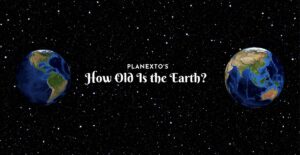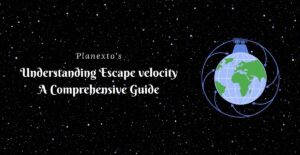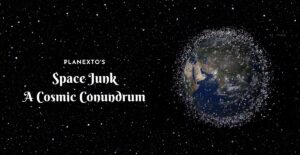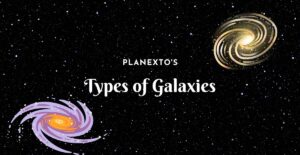Introduction
Hello, wonderful readers! Step into Our FAQs Hub – the ultimate resource where you can quickly find answers to all your burning questions! We’re excited to have you here as we simplify and demystify everything you’ve ever wondered about. Whether you’re a seasoned pro or just dipping your toes into the sea of curiosity, consider this your friendly oasis for straightforward information. Let’s explore, learn, and have some fun together!
FAQs on Solar System
Q) How the solar system name derived?
A) The term “solar system” originates from the Latin words “sol,” meaning sun, and “sistem” or “systema,” indicating a set of things working together. It denotes the celestial bodies system, comprising the Sun, planets, moons, asteroids, comets, and other objects, all unified by the gravitational influence of the Sun..
Q) How solar system works?
A) The solar system functions using the principles of gravity and the laws of physics. The Sun’s gravity is the dominant force in the system, keeping all other objects in orbit around it. The laws of Kepler and Newton govern the elliptical orbits of planets and other celestial bodies as they revolve around the Sun.
Q) Who discovered solar system?
A) Various astronomers and scientists throughout history have contributed to the development of the modern understanding of the solar system. Key figures include Nicolaus Copernicus, Johannes Kepler, Galileo Galilei, and Sir Isaac Newton.
Q) How many years will solar system last?
A) The solar system has been in existence for approximately 4.6 billion years, and it is expected to last for several billion more years. The Sun, which is at the center of the solar system, is currently about 4.6 billion years old and is expected to continue shining for another 5 billion years or so. Eventually, the Sun will evolve into a red giant and then into a white dwarf, which will mark the end of the solar system
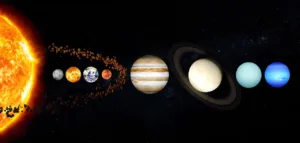
FAQs on Earth
Q) How was the name Earth derived?
A) The name “Earth” originates from English and Germanic words like “eorthe” and “erde,” believed to have roots in ancient Indo-European languages. Earth is the only planet in our solar system whose name does not come from classical mythology or a Roman god
Q) What is total surface area of earth?
A) Certainly, The total surface area of Earth is approximately 510million square kilometers. This includes the land surface area and the surface area covered by oceans.
Q) What is earth made of?
A) Earth is made up of various elements. The major components of Earth’s composition include iron, oxygen, silicon, magnesium, sulfur, nickel, calcium, and aluminum. The Earth’s core, mantle, and crust contain these elements, with iron being the predominant element in the core.
Q) How much water is on earth?
A) Water covers Earth’s surface, constituting approximately 71%. The majority of this water resides in the world’s oceans, with smaller amounts present in lakes, rivers, and other bodies of water.
Q) What is the color of earth?
A) Earth’s color varies depending on the perspective. When viewed from space, the predominant color of the Earth is blue due to its oceans and the scattering of sunlight by the atmosphere. Land areas exhibit a wide range of colors, including green, brown, and various shades, depending on vegetation, terrain, and climate. Atmospheric conditions and human-made features such as cities and agriculture can also influence the colors of Earth.
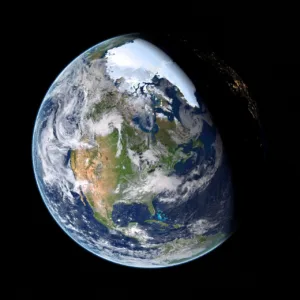
FAQs on International Space Station
Q) What countries are part of ISS?
A) Certainly, The International Space Station (ISS) involves multiple space agencies from various nations, and it is not associated with specific countries. The major partners of the ISS program include NASA (United States), Roscosmos (Russia), ESA (European Space Agency), JAXA (Japan Aerospace Exploration Agency), and CSA (Canadian Space Agency).
Q) Is ISS visible?
A) Yes, the ISS is visible from Earth. As it orbits the planet, observers frequently perceive it as a bright, rapidly moving point of light in the night sky. The station’s visibility depends on your location and the time of day.
Q) What is the speed of ISS?
A) ISS orbits the Earth at an average speed of approximately 28,000 kilometers per hour (about 17,500 miles per hour). It completes an orbit around the Earth roughly every 90 minutes.
Q) Does iss need fuel?
A) Yes, the ISS needs fuel to maintain its orbit and adjust its position when necessary. Users employ propellants for orbital maneuvers, counteracting the impact of atmospheric drag and preserving the station’s altitude. Cargo spacecraft periodically resupply the fuel.
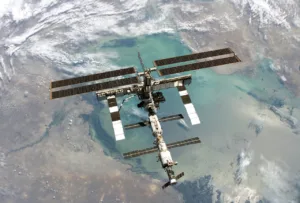
Conclusion
In conclusion, this FAQs blog serves as a quick and reliable resource for a diverse range of topics. We aim to empower readers with the information they need, fostering understanding and supporting their ongoing quest for knowledge. Thank you for being part of this informative journey, and feel free to share your feedback or suggest future FAQ topics.
Follow me on Quora: Click here

